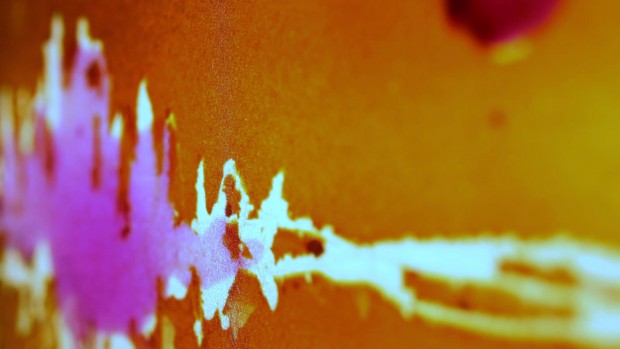@ Traverse Theatre, Edinburgh, on Mon 1 Feb 2016
(part of Manipulate Festival)
It’s a bold or foolish artist who puts his own work alongside that of those who inspire him. For animator Ross Hogg it proves a smart piece of curation, revealing both the lineage of his work and the personal hallmarks he himself is in the process of developing.
In three sections, a series of thematically linked animated shorts are shown, each time culminating with one of Hogg’s own.
The first trio, loosely linked by a theme of memory, starts with stated influence Jonathan Hodgson of the “Liverpool school”. The Man With The Beautiful Eyes (2000) is a dark, primitively drawn childhood tale about the shattering of illusions, based on a Charles Bukowski poem. From there, via Polish animator Karolina Glusiec’s oblique Velocity (2012), we’re brought to Hogg’s The Man Who Mistook His Wife For A Hat (2013), inspired by Oliver Sacks’ book of the same name. In conversation afterwards, Hogg explains the genesis of his debut animation – twelve hour days for five weeks over Christmas in a blacked out room at his parents’ house, slogging away, with much sweeping of the shoulder, on A1 paper. Lack of sunlight tells in the sketchy, monochrome animation, which captivates, although the selected passages from Sacks’ work lack a readily appreciated narrative.
A second segment has an observational bent. Again Hodgson’s work is the departure point – Picasso-seque grotesques haunt a dingy Liverpool nightclub flirting, showing-off and boozing like there’s no tomorrow in the six minute long Nightclub (1983). It’s again easy to draw a line to Hogg’s own Spectators (2013), astutely observed like Hodgson’s, but with action moved from club to football stadium. Both are snapshots of their time: camera phones date Hogg’s piece as accurately as the hairstyles date Hodgson’s. Scratchy, messy and colourful, with well-chosen sound effects, Spectators captures a match day impressionistically. Hogg was once a budding footballer himself, so he knows the turf well. Another selection in this section – the highly stylised, oddly comic and intriguingly existential Wind (2013) by Robert Loebel is a universally-appealing wee film, which could equally fit in the final broadly “surreal” section…
It’s difficult to believe Norman McLaren‘s Dots dates from 1940. Add another twenty-five to thirty years and it would still feel contemporary. Painted directly onto 35mm, it marries sound and abstract imagery in a particularly captivating combination. The debt that Hogg’s Scribbledub (2014) owes to this avant garde Scottish forbear is clear and acknowledged, but none the worse for it. A musical and visual update of McLaren’s piece, it shows another dimension to Hogg’s work. By contrast, Peter Millard’s less abstract, child-like Hogan (2011) (as in Hulk) feels plain daft, while the Brothers McLeod’s 365 (2014) – a second per day digital diary of a year – produces the heartiest laughs of the evening. The vivid colours, monstrous creatures, non-sequiturs and call-backs all seem to speak of our darkest, weirdest and most trivial fleeting thoughts.
Unfortunately for the newcomer, there’s a little of an in-crowd feel to the event. Host Iain Gardner gives a nod to Hogg’s family and girlfriend who are present, and seems to know half the audience by name. A shame it feels so insular, because if nothing else, this array of animated creativity advocates for more mainstream exposure.
